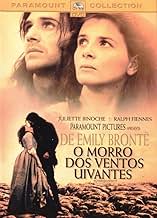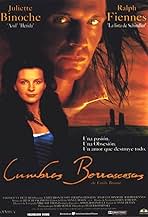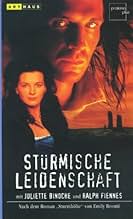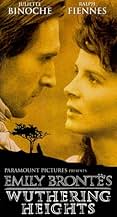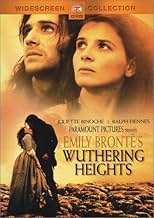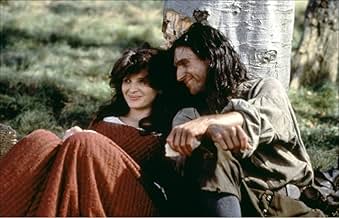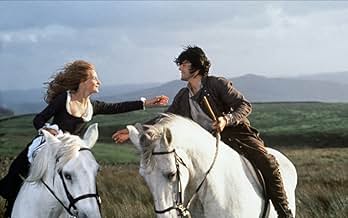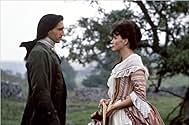A man becomes obsessed with vengeance when his soul mate marries another man.A man becomes obsessed with vengeance when his soul mate marries another man.A man becomes obsessed with vengeance when his soul mate marries another man.
- Awards
- 1 nomination total
- Director
- Writers
- All cast & crew
- Production, box office & more at IMDbPro
Featured reviews
Wuthering Heights (1992) was directed Peter Kosminsky. It is an excellent film adaptation of the novel by Emily Brontë. Two things make this movie memorable. One is that director Kosminsky chose to give us the full novel, carrying it into the second generation. (Most movies end with Heathcliff and Kathy, but this version continue with the interaction of their children.)
The second memorable aspect of the movie is the wonderful acting of the two leads. Juliette Binoche plays Cathy Earnshaw and Ralph Fiennes portrays Heathcliff. (Binoche also portrays her daughter Catherine Linton.) Fiennes is a brilliant actor, and La Binoche is incomparable. There's an extraordinary onscreen chemistry between them.
I'll make special mention of Janet McTeer, who portrays Ellen Dean, the housemaid who knows everyone's secrets. She does everything a supporting actor should do to enhance the power of the movie.
Wuthering Heights would work better on the large screen, but we saw it on DVD, and it worked well enough. The film has an anemic IMDb rating of 6.9. I think that's because the novel is so dark and grim. The movie itself is much better than the rating would suggest. My recommendation is to see it and decide for yourself.
The second memorable aspect of the movie is the wonderful acting of the two leads. Juliette Binoche plays Cathy Earnshaw and Ralph Fiennes portrays Heathcliff. (Binoche also portrays her daughter Catherine Linton.) Fiennes is a brilliant actor, and La Binoche is incomparable. There's an extraordinary onscreen chemistry between them.
I'll make special mention of Janet McTeer, who portrays Ellen Dean, the housemaid who knows everyone's secrets. She does everything a supporting actor should do to enhance the power of the movie.
Wuthering Heights would work better on the large screen, but we saw it on DVD, and it worked well enough. The film has an anemic IMDb rating of 6.9. I think that's because the novel is so dark and grim. The movie itself is much better than the rating would suggest. My recommendation is to see it and decide for yourself.
Only recently have I got round to reading the Emily Bronte classic of 1847 and, having finished it, I immediately wanted to view this 1992 British film version. It is a faithful adaptation in terms of both narrative and language but, although it is filmed in North Yorkshire, both Wuthering Heights and Thrushcross Grange are represented as much larger and grander than I had imagined them. One other criticism: the dance scene is not in the novel and is incongruous because the Grange does not do entertaining.
A notable strength of director Peter Kosminsky's work is its casting. The bewitchingly beautiful Juliette Binoche plays both Catherine Earnshaw and her daughter Cathy Linton and one can imagine why a man would go mad for love of such a woman. As the tormented and cruel Heathcliff, Ralph Fiennes is credibly dark.
Another great virtue of this film version is that, unlike many other movie adaptations of this enigmatic novel, it covers the whole story, rather than stopping at the death of Catherine. The novel is a long one covering three decades, so no film can depict all the incidents, but arguably the most pivotal scene is when Catherine declares her intention to marry Edgar Linton while confessing her love for Heathcliff and this scene is there in this movie.
A notable strength of director Peter Kosminsky's work is its casting. The bewitchingly beautiful Juliette Binoche plays both Catherine Earnshaw and her daughter Cathy Linton and one can imagine why a man would go mad for love of such a woman. As the tormented and cruel Heathcliff, Ralph Fiennes is credibly dark.
Another great virtue of this film version is that, unlike many other movie adaptations of this enigmatic novel, it covers the whole story, rather than stopping at the death of Catherine. The novel is a long one covering three decades, so no film can depict all the incidents, but arguably the most pivotal scene is when Catherine declares her intention to marry Edgar Linton while confessing her love for Heathcliff and this scene is there in this movie.
After all these impressive reviews, there is not much else for me to say except that, on the whole, this film worked for me. The screenplay was very good and at times even excellent, although I would not put it in the same league as "Dangerous Liaisons". The film was visually a masterpiece, capturing essential decadence in its set and on location in Yorkshire.
Supporting cast were notable, particularly Janet McTeer and Simon Shepherd, who was very touching at times, especially with young Catherine. However, the film's quality came from the amazing performance of Ralph Fiennes whose sexual magnetism and intensity stole the screen. Indeed, without Fiennes, the film would have been too under-rated and even slow. Whilst Fiennes exploded in scenes such as breaking into the chapel, I found Binoche very stilted in her "emotional" scenes. At times, she over-acted whilst at others she lacked any expression at all. This made her character quite difficult to understand and I found it hard to imagine how the brooding, precarious Heathcliff could be so infatuated with her. She killed any sense of sexual tension and her acting seemed out of keeping with the others'.
Having said that, the film managed to develop the theme of love/hate with extreme ferocity. It portrayed how love can evoke pity and repulsion, blending passion with destruction, and life with death. Such contrasts effectively convey the eternal dichotomy of human love.
Supporting cast were notable, particularly Janet McTeer and Simon Shepherd, who was very touching at times, especially with young Catherine. However, the film's quality came from the amazing performance of Ralph Fiennes whose sexual magnetism and intensity stole the screen. Indeed, without Fiennes, the film would have been too under-rated and even slow. Whilst Fiennes exploded in scenes such as breaking into the chapel, I found Binoche very stilted in her "emotional" scenes. At times, she over-acted whilst at others she lacked any expression at all. This made her character quite difficult to understand and I found it hard to imagine how the brooding, precarious Heathcliff could be so infatuated with her. She killed any sense of sexual tension and her acting seemed out of keeping with the others'.
Having said that, the film managed to develop the theme of love/hate with extreme ferocity. It portrayed how love can evoke pity and repulsion, blending passion with destruction, and life with death. Such contrasts effectively convey the eternal dichotomy of human love.
Although I would not suggest this film to anyone who has not read the book first (you would be thoroughly confused and missing out on major details of the plot!) I found Wuthering Heights (1992) to be the ideal visual aid to compliment the tragedy and passion of Heathcliff and Catherine's story. If Emily Bronte were alive, she herself would have cast Ralph Fiennes as Heathcliff (he was born for the role!) and Juliette Binoche was perfect particularly when she showed the more playful and childish sides of Catherine (her laughter was exactly as I had imagined - bright and bold...and just irritating enough that it really would drive Heathcliff - and later, Hareton - to suffer from wounded pride when it was directed at their egos). The beauty of this story is that you never really can decide who is the villain and who is the victim....
SPOILERS Much has been made of this version of Emily Bronte's novel being the first cinematic version to be really faithful to her book. For once, we see the story continue after Cathy's death, and Heathcliff is shown to be truly villainous. More importantly ,this version gets across the fact that BOTH Heathcliff and Cathy are mean, selfish people who destroy themselves, each other and don't seem bothered about destroying others too. Ralph Fiennes is almost Bronte's character on screen, and skillfully maintains a bit of sympathy for Heathcliff even when he is committing the most dreadful of acts. Visually the film, filmed for once in Yorkshire, is terrific- bleak in an almost beautiful way, and a few scenes, such as the hand of Cathy's ghost in the window, are indeed excellently done.
However the film is seriously flawed by it's odd lack of emotion. There is a stiff, 'Merchant Ivory' feel to the film, completely wrong with a story as full of powerful, destructive emotions such as this. Only one scene, when Heathcliff cradles Cathy's body in her grave, really has any real power. Heathcliff's end and reunion with Cathy should be tearjerking, but is hardly moving at all. The attempt to include more of Bronte's plot is not too successful either, because many important scenes are rushed to keep the running time low. And there are some odd changes which do not work. What is the point of having Emily Bronte at the start and at the end, especially when Lockwood still narrates the main story? Why do Heathcliff and Cathy appear to have a sexual relationship, and right near the beginning? Why have Heathcliff beat up his wife? Yes, he mistreated her but having him as a wife batterer makes no sense, is he not bad enough already?
Still a reasonably worthy attempt than, but, in terms of cinema, the 1939 version is far superior.
However the film is seriously flawed by it's odd lack of emotion. There is a stiff, 'Merchant Ivory' feel to the film, completely wrong with a story as full of powerful, destructive emotions such as this. Only one scene, when Heathcliff cradles Cathy's body in her grave, really has any real power. Heathcliff's end and reunion with Cathy should be tearjerking, but is hardly moving at all. The attempt to include more of Bronte's plot is not too successful either, because many important scenes are rushed to keep the running time low. And there are some odd changes which do not work. What is the point of having Emily Bronte at the start and at the end, especially when Lockwood still narrates the main story? Why do Heathcliff and Cathy appear to have a sexual relationship, and right near the beginning? Why have Heathcliff beat up his wife? Yes, he mistreated her but having him as a wife batterer makes no sense, is he not bad enough already?
Still a reasonably worthy attempt than, but, in terms of cinema, the 1939 version is far superior.
Did you know
- TriviaSinéad O'Connor makes an uncredited appearance as Emily Bronte.
- Quotes
Heathcliff: I pray one prayer, I repeat it till my tongue stiffens. Catherine Earnshaw, may you not rest as long as I am living! You said I killed you, haunt me, then!... Be with me always, take any form, drive me mad, only do not leave me in this abyss, where I cannot find you!... I cannot live without my life. I cannot live without my soul.
- ConnectionsFeatured in MsMojo: Top 10 Movie Couples Who Are Actually Toxic (2019)
- How long is Wuthering Heights?Powered by Alexa
Details
- Release date
- Countries of origin
- Official sites
- Language
- Also known as
- Wuthering Heights
- Filming locations
- East Riddlesden Hall, Bradford Road, Riddlesden, Keighley, Bradford, West Yorkshire, England, UK(Heathcliff works in the carding shed)
- Production company
- See more company credits at IMDbPro
- Runtime
- 1h 45m(105 min)
- Color
- Sound mix
- Aspect ratio
- 1.85 : 1
Contribute to this page
Suggest an edit or add missing content


